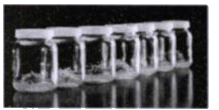It given that the rate at which some bacteria multiply is proportional to the instantaneous number presents. If the original number of bacteria doubles in two hours, in how many hours will it be five times?
The correct Answer is:2log5log2 hours.
Step by step video, text & image solution for It given that the rate at which some bacteria multiply is proportional to the instantaneous number presents. If the original number of bacteria doubles in two hours, in how many hours will it be five times? by Maths experts to help you in doubts & scoring excellent marks in Class 12 exams.
Updated on:21/07/2023Topper's Solved these Questions
- DIFFERENTIAL EQUATIONSBOOK - MODERN PUBLICATIONCHAPTER - DIFFERENTIAL EQUATIONSEXERCISE - Objective Type Questions (A. Multiple Choice Questions) ( Questions from NCERT Textbook:)
16 Videos
- DIFFERENTIAL EQUATIONSBOOK - MODERN PUBLICATIONCHAPTER - DIFFERENTIAL EQUATIONSEXERCISE - Objective Type Questions (A. Multiple Choice Questions) ( Questions from NCERT Exemplar:)
5 Videos
- DIFFERENTIAL EQUATIONSBOOK - MODERN PUBLICATIONCHAPTER - DIFFERENTIAL EQUATIONSEXERCISE - EXERCISE 9 (i) Long Answer Type Questions (II)
7 Videos
- DETERMINANTSBOOK - MODERN PUBLICATIONCHAPTER - DETERMINANTSEXERCISE - Chapter test 4
12 Videos
- INTEGRALSBOOK - MODERN PUBLICATIONCHAPTER - INTEGRALSEXERCISE - COMPETITION FILE
24 Videos
Similar Questions
Bacteria multiply at a rate proportional to the number present. If the original number N double in 3 hours, the number of the bacteria will be 4N is (in hours).
View SolutionBacteria increases at the rate proportional to the number of bacteria present. If the original number N doubles in 3 hours, find in how many hours the number of bacteria will by 4N ?
View Solution
Knowledge Check
The rate of increase in the number of bacterai in a certain becteria culture is propotional to the number present at that time. If is found that the number doubles in 4 hours, then at the end of 12 hours, the number of bacteria are
A4 times the originalB6 time the originalC8 times the originalD10 times the originalRead the following text and answer the following questions on the basis of the same: The rate of increase in the number of bacteria in a certain bacteria culture is proportional to the number present. Given that the number triples in 5 hours.

The general solution is _________ .Alog|N|=Kt+CBlog|Nt|=K+CClog|N|=tDlog|Kt|=N+C
Suppose the growth of a population is proportional to the number present. If the population of a colony doubles in 25 days; in how many days will the population become triple.
View SolutionThe rate of increase in the number of bacteria in a certain bacteria culture is proportional to the number present. Given the number triples in 5 hrs., find how many bacteria will be present after 10 hours. Also find the time necessary for the number of bacteria to be 10 times the number of initial present. [Given loge3=1.0986, e2.1972=9 ]
View SolutionThe rate of increases of bacteria in a certain culture is proportional to the number present. If it doubles in 5 hr., then in 25 hr., its number would be
View SolutionIn a certain culture of bacteria, the rate of increase is proportional to the number present. If it is found that the number doubles in 4 hours, find the number of times the bacteria are increased in 12 hours.
View SolutionThe rate of increase of the bacteria in a culture is proportional to the number of bacteria present and it is found that the number doubles in 6 hours. Prove that the bacteria becomes 8 times at the end of 18 hours.
View SolutionIn a certain culture the number of bacteria at any instant increases at a rate proportional to the cube root of the number present at that instant. If the number becomes 8 times in 3 hours, when will the number be 64 times?
View Solution
